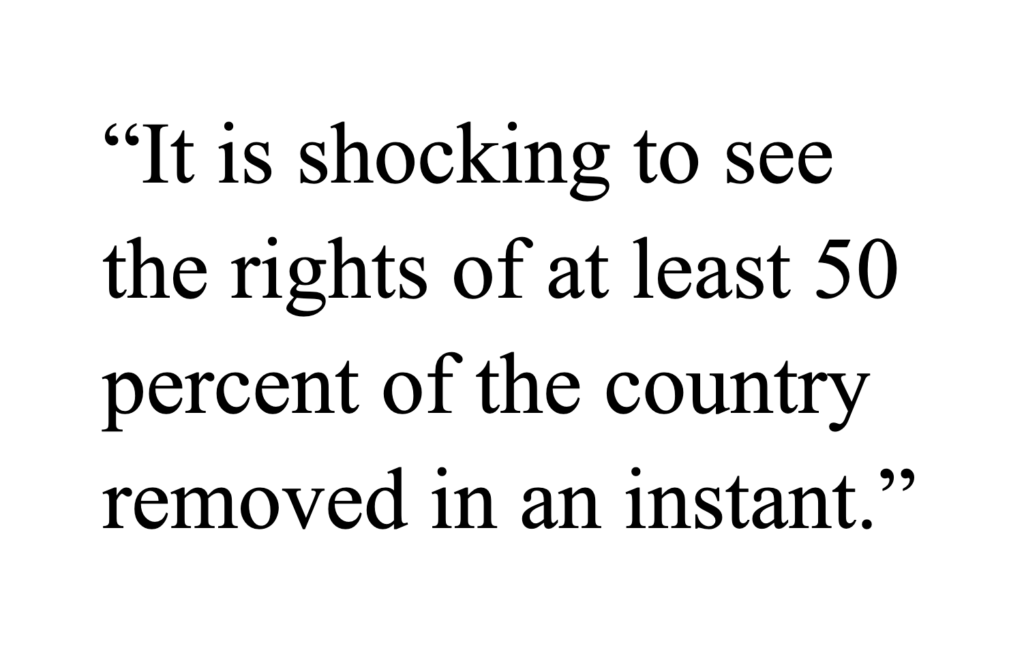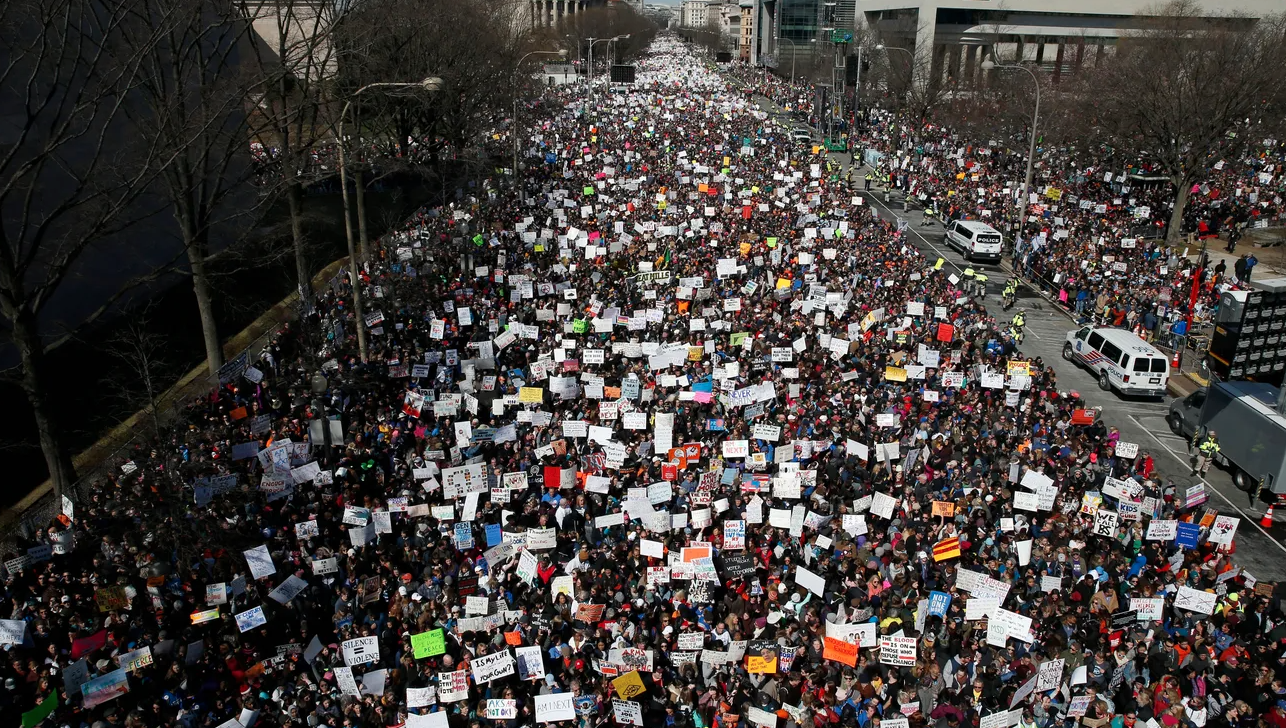America is currently facing an era in which it is becoming increasingly polarized; political ideologies, rather than the voices of the American people, are guiding the people in power.
Our news and social media feeds have flooded with a Supreme Court ruling that has erased 50 years of progress towards reproductive justice: the overturning of Roe. Roe v. Wade was the Supreme Court case, decided in 1973, that established a right to abortion protected by the Constitution. Its overturn leaves the right to abortion entirely up to state governments. A total of 26 states are expected to enact bans. The overturn of Roe represents not only the end to an era of freedom to safely decide when to have a baby, but also the dawn of further suppression of rights by this Supreme Court.
The post-Roe era, the “age of Dobbs,” has been remarkable in the capacity for women to become more complete members of the workforce, and to have more capacity to pursue higher education and economic independence. It is shocking to see the rights of at least 50 percent of the country removed in an instant. Much like many American crises, these bans will disproportionately affect low-income individuals and people of color. Those with the funds and resources to leave a state that bans abortion and seek abortion services in a state where it is allowed may be able to do so, or seek out medication induced abortions via telemedicine. However, this is a luxury that will not be accessible to all individuals.

Historically, when legal and safe abortions are not available, unsafe methods are sought after. The bans will not end abortions — they will end safe abortions. In addition, it is unclear how many states will allow abortion when there is a risk to the pregnant person’s life. The Dobbs v. Jackson ruling that has overturned Roe will cause increased risk to women’s lives. And it may not end with this. It is critical to note that the majority of Americans do not support the SCOTUS ruling and believe that the right to decide whether or not to carry a pregnancy should be an individual decision and not one that can be banned by states.
It is chilling to read Justice Clarence Thomas’s concurring opinion, where he cites other cases — and rights — that he believed could be overturned, including the right to contraception and same-sex marriage. Thomas writes that “in future cases, we should reconsider all of this Court’s substantive due process precedents, including Griswold [right to contraception], Lawrence [right to same-sex sexual relations], and Obergefell [right to same-sex marriage]. Because any substantive due process decision is “demonstrably erroneous,” we have a duty to “correct the error” established in those precedents.” One realizes that Dobbs is merely the tip of the iceberg.
We had naively assumed that access to the rights to safely avoid pregnancy, safely terminate a pregnancy and safely marry a partner of one’s choosing would never be taken away in our lifetimes. It is clear now that these rights are fragile with the current make-up of the Supreme Court. How can we — high school students with limited platforms and little experience in the real world — do anything to spark change and put a stop to this? How will we come of age in an America that threatens to strip freedoms rather than fight to protect them? As writers and learners, we have believed and embraced the concept that knowledge is power and that our words can make a meaningful impact. But is journalism enough to save us from this?
Amidst a nationwide panic over the state of human rights, spectators flocked to New York City for the annual Pride March. Dressed in rainbow colors and glitter, thousands of queer people and allies gathered in lower Manhattan to watch the parade, which took place on June 26th. It was the first in-person parade in three years due to the pandemic, and marchers were glad to be together again. Music played, people danced and the sun shone brightly as ever.
This year, however, Pride felt a little different. Just two days earlier, the Supreme Court announced its shattering Roe v. Wade decision; a mass celebration the same week felt almost tone-deaf. In addition to the loss of reproductive rights, there was a fear about the rights of queer individuals after Justice Thomas’ concurring opinion. Instead of fully feeling like a celebration, a sense of desperation wafted through the air as marchers held onto the hope that gay marriage would be untouched by the Court. Nonetheless, there is something so powerful about coming together in trying times. We lean on each other in times of desperation, and the fact that marchers were able to find a light in a time of darkness truly highlights the strength of the LGBTQ+ community.
At the end of the celebration, however, loud, popping noises were heard in Washington Square Park and rumors swirled about a possible shooting. While it was confirmed that these loud noises were just fireworks, fear of a mass shooting has plagued all large gatherings.
In another large celebration, this time to display patriotic pride, we saw nothing more sickening, yet wholly American, than the Highland Park shooting in Illinois, that left at least 7 people dead on our nation’s independence day. This shooting comes in the aftermath of 12 mass shootings in 2022;, some of the most recent include of those shootings being the racially motivated Buffalo shooting, leaving 10 dead; the shooting at a hospital in Tulsa, leaving 5 dead; and the school shooting in Uvalde, a predominantly Hispanic community, which left 19 children and 2 teachers dead.
The same week that Congress passed the first major gun-control legislation in nearly 30 years, the Supreme Court voted in favor of a major expansion of gun rights. This decision speaks to a larger national reality: we are living in separate worlds, separate countries, with visions and values that are entirely at odds with each other. Why else would there be such a flagrant embrace of constitutional interpretation that disregards precedent and most importantly, the danger American communities face today?
Our attention is too often directed at the wrong people, which perpetuates a grotesque yet again wholly American weaponization of trauma for shock factor and/or entertainment value in the mainstream. This trend continues as politicians and legislators send “thoughts and prayers.” instead of legislative and/or executive action. Our society has gotten to a point —- however, when that point begins is a topic that sparks discussion when that point begins we are open to discussing —- where we are no longer able to sustain this normalized cycle of trauma. We simply don’t know how to respond. That is apparent in our nation’s political paralysis on a multitude of issues, as well as the personal tax all of us experience when reading the news in the morning, forcing ourselves to be numb, because there is only so much thought and energy we can devote to these atrocities before we must go on to live out our respective complicated lives.
Amidst the flood of American atrocities, we have also seen a threat to democracy and human rights in Ukraine over the last six months. Putin’s invasion has jeopardized the structure of the Ukrainian government, the global trade network and the safety of its citizens. A once thriving, independent country has become a war zone because of a highly dangerous, irrational dictator. An estimate of over 10,000 deaths in Ukraine has been made thus far. With Russian forces making continuously destructive gains in cities like Kharkiv and Vinnytsia, the death toll will inevitably keep rising. Our shining Ukrainian President Zelensky is battling an internal and external war. Yet, the Ukrainian spirit and vigor remains, inspiring us all. President Biden has made an effort to provide economic resources without deploying troops. This invasion is one of many global humanitarian crises from migrants in Greece to Genocide in Tigray. It certainly feels like there is nothing we can do to make meaningful change against such powerful political forces. Nevertheless, Fieldston students’ efforts to provide aid — be it through a bake sale, drive, or donation stand — are empowering indications of our community’s support and act as important building blocks to a tower of aid.
Economic sanctions and disruptions of trade supply caused by this conflict have severely impacted both the domestic and global economies. Groceries, gas and housing; three things that drive the most significant areas of spending in the economy for American consumers, and they have gotten more expensive.
Inflation is the word at the forefront of everyone’s minds. Doom-and-gloom articles cycle daily about the four decade high of 9.1% recorded in June. Consumers are already feeling the effects of that percentage in everyday life, causing a spike in anxiety and a drawback in spending to match.
Despite the surprising steadfast strength of personal household finances at the current moment, continuing to match pre-pandemic levels, American anxiety is thwarting spending. Often, an anxious sentiment that translates to frugality is a catalyst for recession.
Meanwhile, this November, New Yorkers will vote in the 2022 gubernatorial election: either for incumbent Kathy Hochul or for another candidate. Some see it as a glimmer of hope — an opportunity to perform their civic duty and impact the future of the country.
However, it is the elections in swing states like Michigan, Georgia and Wisconsin that will have more of a nationwide impact. In Georgia, for example, Democrat Stacey Abrams is running against Republican Brian Kemp, the current governor. In 2018, Abrams narrowly lost to Kemp, which was a huge upset to Democrats who hoped Georgia would turn Blue. Currently, polls show Abrams and Kemp both receiving 48 percent of voter support. While Abrams wins more support from Black voters, Kemp wins more support from white voters, and the voter suppression that marginalized voters face makes it harder for Abrams to gain power. If Abrams were to win in November, she would be Georgia’s first Black female governor, prioritizing the rights of marginalized people in Georgia.
Voting could not be more important than it is right now. But these words have lost meaning, as recent events have demonstrated that voting does not solve all of our country’s problems. Politicians urge us to vote, but consistently fall through on their promises. It has been easy to lose hope for the future and feel as though voting leads us nowhere. Time and time again, America has proven to be anything but a democracy. America was a nation founded by and for a select group of people; at its beginning, only white men who owned property had the right to vote. Today, voting is still limited to that group of people, as marginalized groups are often prevented from voting and their communities are gerrymandered. We can only hope that elected officials keep the promises that they once made and that tangible power will be placed in the hands of the American people.
Given the light survey and assessment we’ve done of the state of our nation as it stands today, we don’t need to tell you in great detail about the struggle our generation faces. We don’t need to go on about the difficulties of coming-of-age with war, inequality, economic catastrophe and disease in the background. It’s dizzying. It’s exhausting. It’s almost paralytically disillusioning. Yet, notice the word almost. Because we cannot have it any other way. It’s true, we are inheriting a divided nation, one that more than one person has argued is more divided than ever before. This division has been one that is generations in the making, with that reality we carry similar sentiments from our parents and their parents before them in this current struggle. But we cannot be paralyzed. History will continue to unfold, and it is our responsibility to remain informed, critical and empowered.






